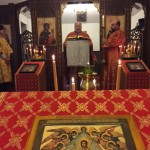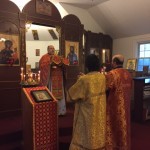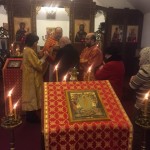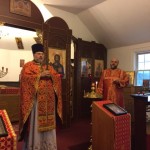On December 18, on the 26th Sunday after Pentecost, as well as feast of St. Sabbas the Sanctified, we had a nice celebration in our Parish. The Rector of St. George Church, Archpriest Igor Tarasov served the Divine Liturgy in our temple. Following the readings from the Sacred Scripture he preached the following homily:
“Dear brothers and sisters! The first Gospel lesson we have heard today is about the importance of being grateful. It is also read for the Church services of thanksgiving. When the Holy Fathers speak about prayer – and prayer is our communication with God – they indicate that the highest sort of prayer is a prayer of thanksgiving. The Fathers say that this is the prayer by which the Angels constantly praise the Lord before His heavenly throne. And they find joy, happiness and the whole sense of their existence in that prayer. Thus it is very desirable to learn this kind of prayer, the prayer of thanksgiving.”
“Our spiritual experience shows that it is much easier to learn the prayer of petition. Our very life forces us to ask God for help. When we are in trouble, we begin to pray and to ask God to help us. We also ask for health, for success in our deeds, for the forgiveness of our sins. This kind of prayer is also important. Because of our sorrows and misfortunes we convert to God and pray to Him asking for something. And because of this prayer we understand that our life without God has no sense and that He is the only one who can really help us.”
“It is good that we realize that. But we should also realize that God is the only one who can heal us from our sins. And if we may remember to give thanks to the Lord for His help in our life situations, we often forget to be grateful to God for His power to heal us from sin. This happens because we get used to our sins. They become our second nature. And we do not notice them. This attitude of not noticing our sins, not realizing our sinfulness is very dangerous for the soul. And one of the results of such an attitude is our inability to be grateful to God.”
“To realize how bad is ungratefulness we can imagine a very casual example. Let’s say we rescued our next door neighbor from a great danger. Let’s say that we saved his life. It may happen – life is full of surprises. And let’s imagine that after a week or so this person does not wish to talk to us, to say “hello” and even look at our side, turns his face away from us. Would we like that? Of course, not. We would be offended and shocked. Comparing that example to our own spiritual situation we may see that God is the one who rescued all of us from a great danger of being condemned, He saved us from our sins, from our spiritual death. He also established His Church on the earth; and the Church holds the keys to eternal life. The Lord granted us the greatest Mysteries which make our souls alive, heal them from a sinful state. The Lord opened for us His embrace, so we may not perish in sin and in our wickedness. But we ungratefully turn away from Him and do not wish to see the Lord in our life. How evil is such ungratefulness!”
“Today we heard about such ungratefulness in the Gospel lesson (Lk. 17, 12-19). Our Lord healed ten lepers. Leprosy is a terrible disease when the human body is decaying but a sick person does not feel pain. Thus it is an image of a sinful soul that does not feel its sins. And those ten lepers lifted their voices crying, “Jesus, Master, have mercy on us!” (Lk. 17, 13). And the Lord performed a miracle. He sent them to the priests to be examined, and while they went, they became cleansed. And behold, only one of those ten returned, began to glorify God and thanked Jesus. And the Gospel indicates that he was a Samaritan, not a Jew. Again, we hear that Samaritans who were heretics and enemies, could be better than the Jews who were expected to be more pious and just. Jesus answered and said, “Were there not ten cleansed? But where are the nine? Were there not any found who returned to give glory to God except this foreigner?” (Lk. 17, 17-18).”
“Dear brothers and sisters! Let us hear these words of Christ which can be related to us, the ungrateful ones. Where are we who were healed by God from sin? Where are we who are born in the font of Baptism and anointed with the gift of the Holy Spirit? Which is our gratefulness to the Lord? How do we show it? Do we glorify the Lord? Do we praise Him by our life? Where are we, the Christians called for eternal life? Will we give thanks to our Lord and Savior! Let us hear that voice of Christ! And let us give thanks to Him by our words, our deeds and by our lives!”
During the time of preparation for Holy Communion the choir prayerfully performed hymns dedicated to Venerable Sabbas.
After the Liturgy dismissal the Rector preached a brief sermon in Russian to stress the main ideas of his English homily. He also congratulated our Sacristan Andrew Malyshew on the occasion of his past name day wishing him God’s help, good health and success in his service to the Church. Traditional Polychronion was sung.




